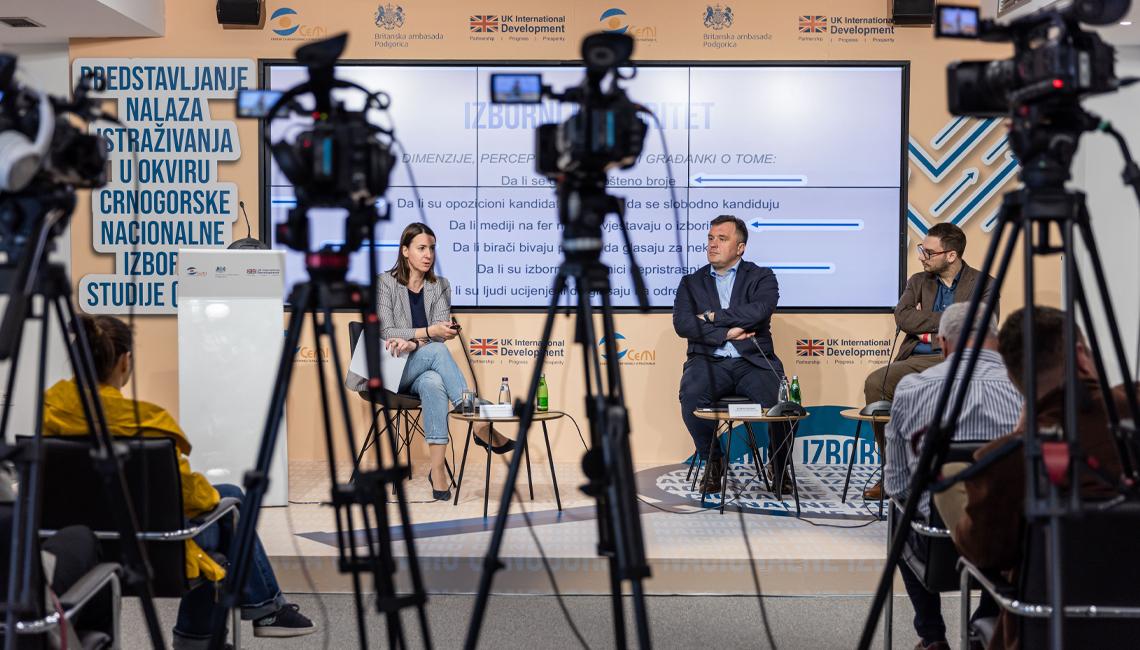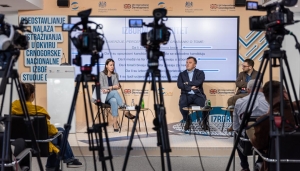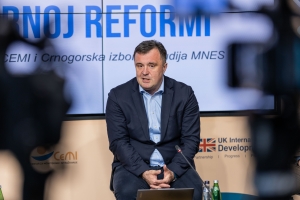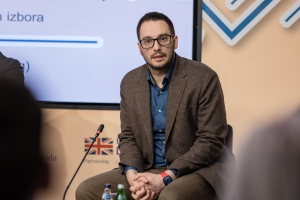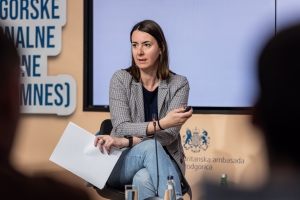The electoral reform process should be opened to the public and the emphasis should be placed on building citizens' trust in the electoral process, given the relatively low rating of election integrity, which is 2.9 out of 5, and voter distrust.
This was announced at the press conference on the occasion of the presentation of research findings within the Montenegrin National Election Study (MNES), within the project financed by the British Embassy Podgorica.
The President of the Governing Board, CeMI, Zlatko Vujovic, said that the Montenegrin national election study is part of the comparative study on electoral systems (CSES) which is carried out in a large number of countries, explaining that a questionnaire is used that is largely identical for all countries.
"This research will be part of a global database, so researchers interested in these issues will be able to compare findings from several countries." "We wanted to include in the preparation of the study all the professional and scientific resources that Montenegro has when we talk about electoral reform," said Vujovic.
He announced that the findings of the study will be presented to the Parliamentary Committee for Electoral Reform.
The chief researcher of the Montenegrin Electoral Study, Olivera Komar, said that changing electoral rules is an important, demanding and responsible job.
"The Montenegrin national election study is a scientific project that we have been working on since 2012. However, one focus of research at the global level has been on electoral integrity. We asked a series of questions about how citizens perceive some of the basic problems when it comes to the electoral process, and based on that, we calculated the electoral integrity index," explained Komar.
According to her, they investigated the dimensions and perceptions of citizens about: whether votes are counted fairly, whether opposition candidates are prevented from running freely, whether the media reports on the elections in a fair way, whether voters are paid to vote. for some, whether election officials are impartial and whether people are being blackmailed into voting a certain way.
"On the question of whether the votes are counted fairly, the survey showed that a fifth of the citizens expressed doubt that the votes were counted fairly. In addition, a third do not have an opinion on that issue," said Komar.
She said that on the question of whether opposition candidates are prevented from running freely, 37.7 percent believe that there is no such thing, and 22.8 percent that there is a prevention.
"When asked whether the media reports on the elections in a fair way, 25.1 percent believe that this does not happen, while 41.8 percent believe that the media reports on the elections in a fair way." Furthermore, we asked citizens whether voters are paid to vote for someone, and the research showed that every second citizen in Montenegro believes that people receive money for voting, while 16.8 percent of them believe that this usually does not happen," stated Komar.
According to her, when asked if election officials are impartial, close to a third of citizens believe that they are mostly not and that this does not happen, while 32.9 percent believe that the behavior of election officials is mostly impartial.
"When asked if people are blackmailed into voting a certain way, the survey found that one in two people think people are blackmailed into voting a certain way, and one in five think it happens all the time, while 30 percent think it it happens very often," Komar said.
She explained that based on these research results, the electoral integrity index was derived, which in the range of one to five in Montenegro is 2.97.
"Given the importance of the electoral process, we should aim for that integrity and trust in the electoral process to be significantly higher than this," Komar pointed out.
When asked whether the previous parliamentary elections were conducted fairly, Komar said that the survey showed that every second citizen says that they were mostly conducted fairly, every fifth says that they were mostly not conducted fairly, while one third of them say that they cannot give an opinion on that question.
"When it comes to trust in the State Election Commission (SEC), the survey showed that 50.6 percent have great or mostly trust in that institution. Based on this data, we see the potential for additional strengthening of the SEC's role," said Komar.
Presenting the data related to the turnout structure, Komar said that the research showed that the voter structure is dominated by older voters and that we have a problem when it comes to the younger demographic category and voters between 18 and 34 who are below average when it comes to turnout.
"Women and men vote equally and there is no statistically significant difference between men and women when it comes to turnout." This data speaks of the potential for the activation of women who are in the political process," said Komar.
She pointed out that citizens were also asked if they were interested in politics, and that research showed that men and women go out to vote equally, but on average men are more and somewhat interested in politics, while women and young people are less interested.
"We also asked citizens to what extent Montenegro is a democratic state, and the survey showed that 33.3 percent of citizens believe that we are not a democratic state, while 47.9 percent of them say that we are a democratic state," said Komar.
She said that when asked how satisfied those who voted were with their decision, the survey showed that one in ten was somewhat dissatisfied or not satisfied at all, while 87.1 percent said they were mostly satisfied.
"Furthermore, when we asked the abstainers whether they were satisfied with not participating, the survey showed that 36 percent of them were not satisfied that they did not turn out, and every fifth abstainer was very dissatisfied with not participating in the elections. It is a very important potential for political options, but also for those dealing with electoral reform," said Komar.
Presenting the data related to the gender aspect of the elections, Komar said that citizens were asked if they were satisfied with the quantitative presence of men and women in the Parliament of Montenegro, and that the research showed that 50.8 percent believed that the presence of women too low.
"We also asked citizens how they see men and women as leaders in times of health and economic crisis, and the survey showed that 46.1 percent think that it should be only a woman or only a man in the event of a health crisis, while 53.9 percent believes that both are needed equally. When it comes to the economic crisis, the data are similar - half of the citizens think that there should be no difference between men and women when it comes to the ability to lead the country in that situation," said Komar.
Speaking about the recommendations in the context of the electoral reform, Komar said that the electoral process and the electoral reform process should be approached extremely carefully, especially considering the mistrust of the citizens.
"This means that the process of electoral reform and elections should be as open and transparent as possible when it comes to the citizens of Montenegro." We can also conclude that there is potential when it comes to the SEC in the sense that it has significant trust of the citizens in relation to other institutions and that there is room to use it in terms of strengthening the systematic position in the entire election process", said Komar.
She pointed out that there is a need to work with voters, especially younger voters, stating that the wave of abstinence comes from younger voters.
"There is also the potential to turn abstainers into voters - one in three dissatisfied with their decision not to vote." Also, there is a need to activate the female electorate, and it is also necessary to regulate the behavior of the internet media during the elections, which assume a dominant role for information, but increasingly also for interaction," said Komar.
The researcher of the Montenegrin Electoral Study, Slaven Zivkovic, said that the Montenegrin National Electoral Study is a project they have been working on since 2012, stating that since then Montenegro has been introduced to the international project Comparative Study of Electoral Systems in which over 50 countries participate.
"This is the first systematic and longitudinal study of election behavior in Montenegro. This means that, in addition to being able to compare data between countries, we can also look at the results over time. The first study was done after the 2012 elections, the second after the 2016 elections, and for the purposes of that international project, we had one test after the 2020 elections, and now the study was conducted after the 2023 parliamentary elections," said Zivkovic.
He stated that the study was conducted through a public opinion survey that included 1,200 adult respondents.
"Such researches are always carried out in the post-election cycle with the aim that when the political passions in the country have subsided, we try to ask the citizens how they voted in the elections and a whole series of questions that later help us understand the demographic differences, which among the supporters of different political parties and among to different groups in society," said Zivkovic.
Presenting data on media consumption during the election campaign, Zivkovic said that the research showed that the online space is taking over dominance when it comes to citizens' information.
"Every fourth citizen says that he was informed daily during the election campaign through social networks and internet portals. There is still a large percentage of those who watch television," said Zivkovic.
Given that social networks and portals are taking precedence when it comes to informing citizens, Zivkovic pointed out that they asked citizens how likely they were to comment on political and social topics on social networks, and that research showed that every second citizen would never comment on them. or it is unlikely, while 15 percent said it is very likely that they would comment.
"We also asked them how likely it is that you would engage in a discussion with political dissenters on social networks, and the research showed that every second citizen would not do so, and a fifth that it was very likely that they would engage in a discussion with political dissenters ", said Zivkovic.
Speaking about the electronic identification of voters, Vujovic explained that a large number of voters have biometric ID cards with a chip, which could enable better statistics on the structure of voters.
"If we had a reader that recognizes the voter's chip, electronically identifies it and retrieves the data that is stored, it would help to have real-time extensive statistics that would provide a huge resource for research during and after election day," Vujovic said.
Therefore, Vujovic believes that it is necessary to oblige the voters to take out an electronic (biometric) ID card before the election, and the SEC, i.e. state authorities, to provide software solutions that would enable the deposit and use of data obtained through the electronic identification of voters through an electronic ID card.
